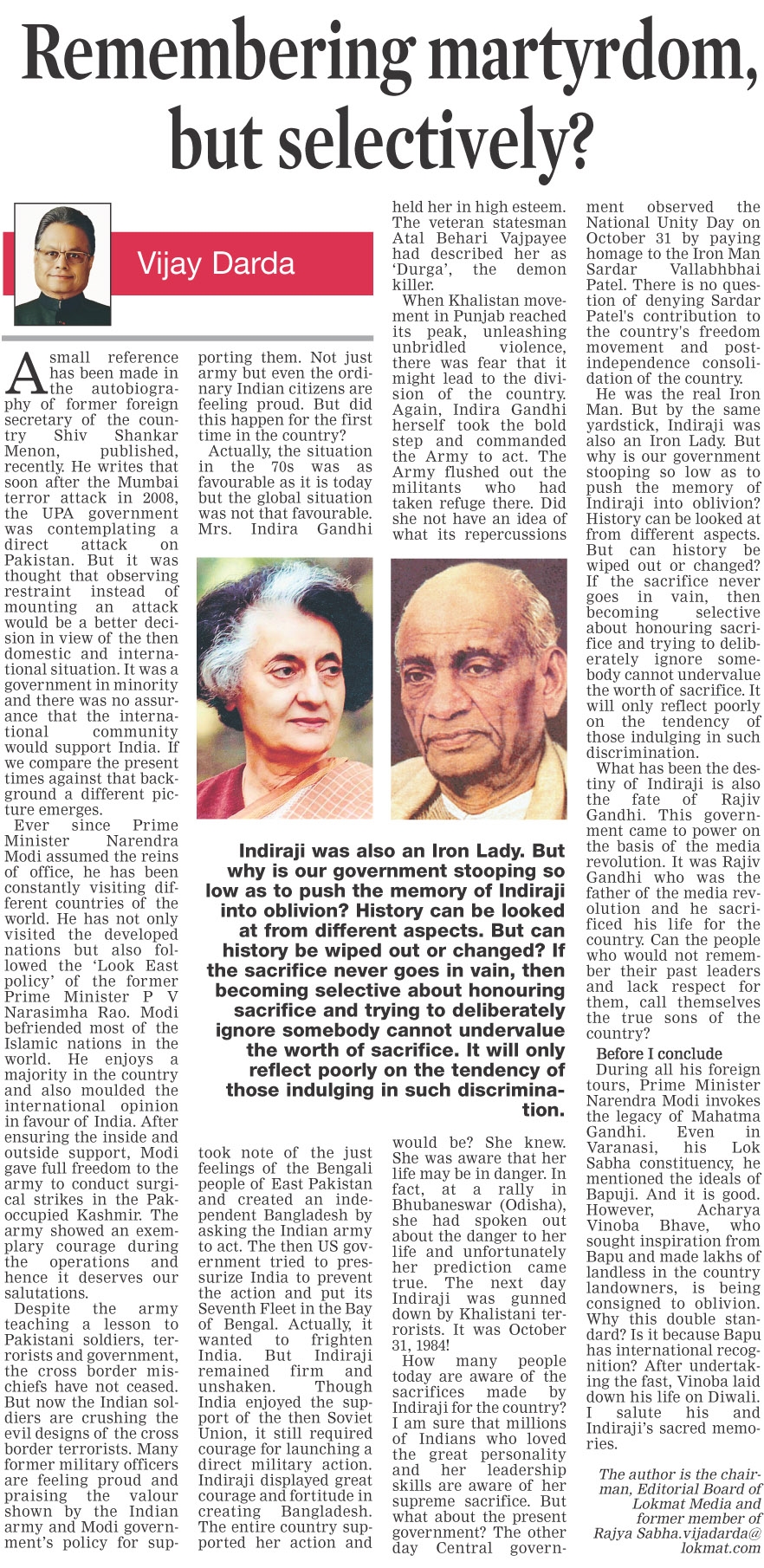Remembering martyrdom, but selectively?
 By Vijay Darda | 01-11-2016
By Vijay Darda | 01-11-2016
A small reference has been made in the autobiography of former foreign secretary of the country Shiv Shankar Menon, published, recently. He writes that soon after the Mumbai terror attack in 2008, the UPA government was contemplating a direct attack on Pakistan. But it was thought that observing restraint instead of mounting an attack would be a better decision in view of the then domestic and international situation. It was a government in minority and there was no assurance that the international community would support India. If we compare the present times against that background a different picture emerges.
Ever since Prime Minister Narendra Modi assumed the reins of office, he has been constantly visiting different countries of the world. He has not only visited the developed nations but also followed the ‘Look East policy’ of the former Prime Minister P V Narasimha Rao. Modi befriended most of the Islamic nations in the world. He enjoys a majority in the country and also moulded the international opinion in favour of India. After ensuring the inside and outside support, Modi gave full freedom to the army to conduct surgical strikes in the Pak-occupied Kashmir. The army showed an exemplary courage during the operations and hence it deserves our salutations.
Despite the army teaching a lesson to Pakistani soldiers, terrorists and government, the cross border mischiefs have not ceased. But now the Indian soldiers are crushing the evil designs of the cross border terrorists. Many former military officers are feeling proud and praising the valour shown by the Indian army and Modi government’s policy for supporting them. Not just army but even the ordinary Indian citizens are feeling proud. But did this happen for the first time in the country?
Actually, the situation in the 70s was as favourable as it is today but the global situation was not that favourable. Mrs. Indira Gandhi took note of the just feelings of the Bengali people of East Pakistan and created an independent Bangladesh by asking the Indian army to act. The then US government tried to pressurize India to prevent the action and put its Seventh Fleet in the Bay of Bengal. Actually, it wanted to frighten India. But Indiraji remained firm and unshaken.
Though India enjoyed the support of the then Soviet Union, it still required courage for launching a direct military action. Indiraji displayed great courage and fortitude in creating Bangladesh. The entire country supported her action and held her in high esteem. The veteran statesman Atal Behari Vajpayee had described her as ‘Durga’, the demon killer.
When Khalistan movement in Punjab reached its peak, unleashing unbridled violence, there was fear that it might lead to the division of the country.
Again, Indira Gandhi herself took the bold step and commanded the Army to act. The Army flushed out the militants who had taken refuge there. Did she not have an idea of what its repercussions would be? She knew. She was aware that her life may be in danger. In fact, at a rally in Bhubaneswar (Odisha), she had spoken out about the danger to her life and unfortunately her prediction came true. The next day Indiraji was gunned down by Khalistani terrorists. It was October 31, 1984!
How many people today are aware of the sacrifices made by Indiraji for the country? I am sure that millions of Indians who loved the great personality and her leadership skills are aware of her supreme sacrifice. But what about the present government? The other day Central government observed the National Unity Day on October 31 by paying homage to the Iron Man Sardar Vallabhbhai Patel. There is no question of denying Sardar Patel’s contribution to the country’s freedom movement and post-independence consolidation of the country.
He was the real Iron Man. But by the same yardstick, Indiraji was also an Iron Lady. But why is our government stooping so low as to push the memory of Indiraji into oblivion? History can be looked at from different aspects. But can history be wiped out or changed? If the sacrifice never goes in vain, then becoming selective about honouring sacrifice and trying to deliberately ignore somebody cannot undervalue the worth of sacrifice. It will only reflect poorly on the tendency of those indulging in such discrimination.
What has been the destiny of Indiraji is also the fate of Rajiv Gandhi. This government came to power on the basis of the media revolution. It was Rajiv Gandhi who was the father of the media revolution and he sacrificed his life for the country. Can the people who would not remember their past leaders and lack respect for them, call themselves the true sons of the country?
Before I conclude…
During all his foreign tours, Prime Minister Narendra Modi invokes the legacy of Mahatma Gandhi. Even in Varanasi, his Lok Sabha constituency, he mentioned the ideals of Bapuji. And it is good. However, Acharya Vinoba Bhave, who sought inspiration from Bapu and made lakhs of landless in the country landowners, is being consigned to oblivion. Why this double standard? Is it because Bapu has international recognition? After undertaking the fast, Vinoba laid down his life on Diwali. I salute his and Indiraji’s sacred memories.
Relevant Articles
Rahul Gandhi may show the right way!
Factionalism, sycophancy big enemies of Congress
India-Pakistan dialogue beyond official talks
Natwar’s memoirs: Seeking revenge through betrayal
When soldiers perish under snow
